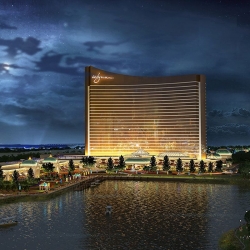The Massachusetts Gaming Commission (MGC) plans to announce in the next month whether Wynn Resorts is suitable for a gaming license in the commonwealth. Wynn Resorts was one of 12 individual qualifiers listed as “suitable” for a casino license when the MGC made a list of potential applicants in December 2013.
MGC Chairman Stephen Crosby and his panel chose to reconsider Wynn’s status after the Wall Street Journal released an investigative report in January 2018 that more than a dozen company employees had accused founder and CEO Steve Wynn of sexual harassment. The WSJ report interviewed 150 current and former Wynn Resorts employees, while the newspaper’s reporters investigated company settlements with employees who had filed grievances in the past.
In February 2018, Steve Wynn resigned from Wynn Resorts, then sold all shares of the company in March. Then Wynn Resorts’ new CEO, Matt Maddox, announced that the Wynn Boston Harbor would be renamed the Encore Boston Harbor. Encore is the name given to Phase Two expansions of Wynn casino-resorts.
Despite those changes, the Massachusetts Gaming Commission announced later in the spring it would review the company’s suitability to own Encore Boston Harbor. Maddox and fellow Wynn board members appeared at hearings of the Massachusetts Gambling Commission to answer questions about changes made, as well as future plans.
Kazuo Okada and Marc Schoor
Stephen Crosby plans to look at both the corporation itself, along with certain key individuals in the Wynn Resorts’ company structure. Of the 11 people besides Steve Wynn who were reviewed in December 2013, two were dropped from the original investigation: Kazuo Okada and Marc Shoor. Osada was a top investor and a gaming executive, as he owned Universal Entertainment (pachinko, slots) out of Japan. By the time the 2013 report was finished, Okada had left the Wynn board of directors.
Marc Schoor was Wynn COO, but he resigned abruptly due to a federal investigation. The Nevada Gaming Control Board found Schoor unsuitable, because of his “alleged ties to former strip club owner with ties to mob figures, and allegations of hiding evidence from investigators, illegal sports wagering on the Internet and being an agent for an offshore Internet sports book“.
In March 2018, two more people on the original list of 11 figures ended their relationship was Wynn Resorts: Ray Irani and Alvin Shoemaker. Ray Irani was a member of the Wynn governance committee at the time, but he resigned shortly after Steve Wynn’s resignation. Alvin Shoemaker said he would not run for reelection when his current term as a board member ends in May 2019.
Elaine Wynn’s SEC Filing
Meanwhile, Elaine Wynn filed papers with the Securities & Exchange Commission (SEC) in April urging shareholders to withhold votes on certain remaining board members. According to Elaine Wynn, the former wife of Steve Wynn and the company’s remaining largest shareholder, suggested these “legacy” board members were Steve Wynn loyalists who should not be a part of the company’s future.
Elaine Wynn’s filing stated, “Some members of the current board are directly implicated by the Massachusetts regulatory investigation. I do not know what the Commission will conclude, but I believe that the legacy directors would prefer that their actions not be scrutinized by the gaming officials.”
Wynn Considered Selling Encore Boston Harbor
At the time, Matt Maddox had discussed the possibility of selling the $2.4 billion Encore Boston Harbor to another company. In April 2018, Wynn Resorts had spent $1.3 billion of the planned $2.4 billion it would take to open Encore Boston Harbor in 2019.
Elaine Wynn stated the Wynn board of directors was planning to sell the lucrative Boston-area casino for personal reasons — not sound financial reasons. In an appeal to shareholders, Elaine Wynn said Matt Maddox and other board members wanted to avoid the scrutiny of the Massachusetts Gaming Commission. She urged the board to retain Encore Boston Harbor, which made sense to keep, and either resign from the company or submit to the MGC’s probe.

